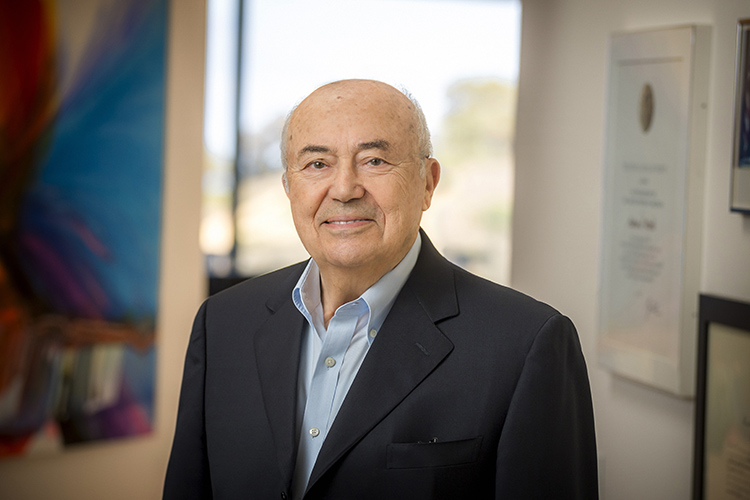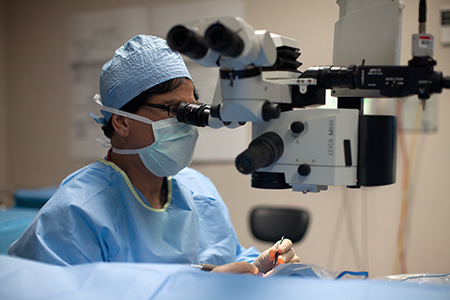Communications Pioneer Andrew J. Viterbi Gives UC San Diego $50 Million to Support Ophthalmology
Published Date
By:
- Judy Piercey
Share This:
Article Content

Andrew J. Viterbi, a renowned pioneer in the communications world, is creating a lasting legacy in health care through a philanthropic gift of $50 million to UC San Diego. Photo by Erik Jepsen, UC San Diego Publications.
Andrew J. Viterbi, a renowned pioneer in the communications world, is creating a lasting legacy in health care through a philanthropic gift of $50 million to the University of California San Diego. Inspired by his father, an ophthalmologist, Viterbi’s gift will name The Viterbi Family Department of Ophthalmology and The Viterbi Family Vision Research Center, and create six new endowed chairs for faculty. His generous support is dedicated to advancing research, education and eye care. The gift contributes to the Campaign for UC San Diego, the university’s $2 billion fundraising effort.
“Our family has been in San Diego for 45 years. I’ve seen UC San Diego transform the city, the county and the southernmost region of California,” said Viterbi. “I’ve supported universities including MIT, Technion in Israel, USC and UCLA. And so it’s time for UC San Diego.”
Viterbi is a co-founder and retired vice chairman and chief technical officer of Qualcomm Inc. He is known in the wireless communications industry for the “Viterbi Algorithm,” which has forever changed the way people connect and communicate. Viterbi spent equal portions of his career in industry, having previously co-founded Linkabit Corporation, and in academia as an engineering professor—first at UCLA and then at UC San Diego, where he is now Professor Emeritus. He is currently president of the Viterbi Group, a technical advisory and investment company. Viterbi earned a doctorate from the University of Southern California, and S.M. and S.B. degrees from the Massachusetts Institute of Technology.
“With this historic gift—the largest ever to the Department of Ophthalmology—UC San Diego has the potential to cure blindness to help millions of people worldwide,” said Chancellor Pradeep K. Khosla. “Andrew Viterbi is truly an exceptional innovator. We thank him for his vision and support of our groundbreaking work in ophthalmology.”
The Viterbi Family Department of Ophthalmology—the research and academic program of the UC San Diego School of Medicine—is the first named Health Sciences department at the university. The department is dedicated to clinical care and vision research, and complements the research and clinical efforts of the Shiley Eye Institute at UC San Diego Health. This year marks the 50th anniversary of the School of Medicine.

Six endowed faculty chairs created through the gift will provide sustained support to attract and retain exceptional ophthalmologists and scientists.
The Viterbi Family Vision Research Center, to be located on the La Jolla Campus of UC San Diego Health, will house research for a number of different ophthalmological diseases and interdisciplinary ophthalmological research. Studies will focus on curing glaucoma blindness, restoring vision of those blinded by retinal degeneration, and providing sight to individuals who have reversible vision loss due to cataracts or infections, among other research.
Viterbi was born in Bergamo, Italy to Italian Jewish parents. His family fled Italy for America in 1939 because of the racial laws put into operation by Fascist Italy that were directed mainly against Italian Jews.
The gift will honor Viterbi’s father, celebrated ophthalmologist Achille Viterbi, who was 53 years old when Andrew was born. “His hospital was the regional hospital in Bergamo, and he was one of the leading citizens,” he said. “I am certainly honoring my father’s memory … he struggled to make a home for us in a new world and now I am in the position to honor his name.
“My father passed his medical license in Italy in 1905, then had to redo the whole thing in the Commonwealth of Massachusetts in 1941,” Viterbi continued. “His career was truncated because of the racial laws of Italy’s Fascist government. The restart was very painful, very difficult. I recently discovered a letter he had written to a colleague and friend in Italy after the war. And in it he was explaining that the medical association put a condition that newly licensed foreigners had to wait five years after they passed their medical license to get hospital privileges at first class hospitals. Effectively, he set up a practice without the full support of a hospital presence.”
Viterbi said his father would often quote Latin phrases including per aspera ad astra meaning “through hardship to the stars.”
Robert N. Weinreb, MD, chairman and Distinguished Professor of Ophthalmology at UC San Diego School of Medicine, will work closely with Viterbi to ensure that the research, clinical and education promises of the gift are fulfilled. Weinreb is one of the world’s preeminent glaucoma specialists. His commitment to treating, curing and preventing eye disease through evidence-based medicine and leading-edge research has greatly influenced the department’s academic culture.

Robert N. Weinreb, MD, chairman and Distinguished Professor of Ophthalmology at UC San Diego School of Medicine, will work closely with Viterbi to ensure that the research, clinical and education promises of the gift are fulfilled.
“Dedicated clinicians and vision scientists at the UC San Diego Shiley Eye Institute and Department of Ophthalmology drive change to make a difference in the lives of our patients and all those from throughout the world afflicted with blinding eye diseases,” said Weinreb. “This enduring and extraordinary gift by Andrew Viterbi will be transformative. Not only will it expand interdisciplinary collaborations across campus and the San Diego community, but also worldwide. Moreover, it will accelerate the pace of discovery and innovation of our vision research that is focused on preventing vision loss, restoring vision and, most importantly, curing blindness.”
The six endowed faculty chairs will attract and sustain exceptional ophthalmologists and scientists in perpetuity. They will enable faculty research, clinical practice and dedication to education with sustained support. The first chair will be named after Andrew Viterbi’s father, physician Achille Viterbi. The second chair will be named after internationally recognized ophthalmologist Alfred Vogt, Dr. Achille Viterbi’s colleague and mentor and the individual who helped make the family’s immigration to the U.S. possible. The remaining chairs will be named The Viterbi Family Endowed Chairs.
Over the years, Viterbi’s charitable giving has focused on education. “If I were to estimate what percentage my philanthropy went to education—K-12 through graduate schools and university research—I guess it would probably be three quarters,” he said. “Education is how anyone, immigrants in particular, or a child of share croppers in the south or any other modest beginning, can succeed in our society.” Viterbi added that all three of his children received their education in the University of California system.
Share This:
You May Also Like
Stay in the Know
Keep up with all the latest from UC San Diego. Subscribe to the newsletter today.



